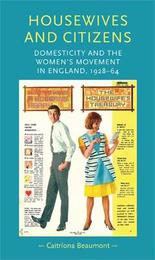
|
Housewives and Citizens: Domesticity and the Women's Movement in England, 1928-64
Paperback / softback
Main Details
| Title |
Housewives and Citizens: Domesticity and the Women's Movement in England, 1928-64
|
| Authors and Contributors |
By (author) Caitriona Beaumont
|
| Series | Gender in History |
|---|
| Physical Properties |
| Format:Paperback / softback | | Pages:256 | | Dimensions(mm): Height 216,Width 138 |
|
| Category/Genre | British and Irish History |
|---|
| ISBN/Barcode |
9780719097256
|
| Classifications | Dewey:305.40941 |
|---|
| Audience | | Professional & Vocational | |
|---|
|
Publishing Details |
| Publisher |
Manchester University Press
|
| Imprint |
Manchester University Press
|
| Publication Date |
1 March 2015 |
| Publication Country |
United Kingdom
|
Description
After an extremely successful debut in hardback, Housewives and citizens is now available in paperback for the first time. This book explores the contribution that five conservative, voluntary and popular women's organisations made to women's lives and to the campaign for women's rights throughout the period 1928-64. The book challenges existing histories of the women's movement that suggest the movement went into decline during the inter-war period, only to be revived by the emergence of the Women's Liberation Movement in the late 1960s. It is argued that the term 'women's movement' must be revised to allow a broader understanding of female agency encompassing feminist, political, religious and conservative women's groups who campaigned to improve the status of women throughout the twentieth century. The book provides a radical re-assessment of this period of women's history and in doing so makes a significant contribution to ongoing debates about the shape and impact of the women's movement in twentieth-century Britain. -- .
Author Biography
Caitriona Beaumont is Principal Lecturer in Social History at London South Bank University -- .
Reviews'Housewives and Citizens offers a refreshing perspective on women's activism in 20th century England, enlarging - and challenging - our study of the past. It is a timely reminder that women who did not identify with feminism were nonetheless active in campaigning for improvements in women's lot.' June Purvis, Times Higher Education, 21 November 2013 -- .
|